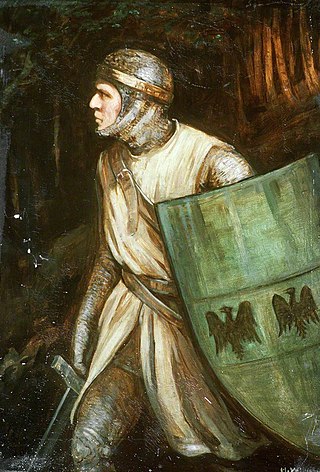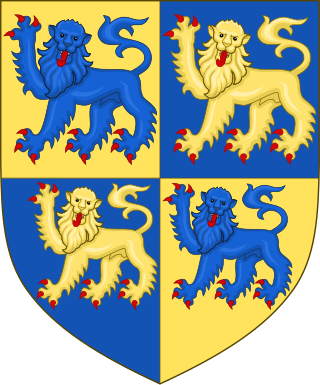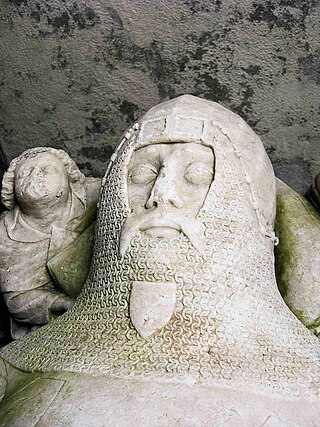Related Research Articles

Owain ap Gruffudd was King of Gwynedd, North Wales, from 1137 until his death in 1170, succeeding his father Gruffudd ap Cynan. He was called Owain the Great and the first to be styled "Prince of Wales", and the "Prince of the Welsh". He is considered to be the most successful of all the North Welsh princes prior to his grandson, Llywelyn the Great. He became known as Owain Gwynedd to distinguish him from the contemporary king of Powys Wenwynwyn, Owain ap Gruffydd ap Maredudd, who became known as Owain Cyfeiliog.

The Kingdom of Gwynedd was a Welsh kingdom and a Roman Empire successor state that emerged in sub-Roman Britain in the 5th century during the Anglo-Saxon settlement of Britain.
Dafydd is a Welsh masculine given name, related to David, and more rarely a surname. People so named include:

Madog ap Llywelyn was the leader of the Welsh revolt of 1294–95 against English rule in Wales. The revolt was surpassed in longevity only by the revolt of Owain Glyndŵr in the 15th century. Madog belonged to a junior branch of the House of Aberffraw and was a distant relation of Llywelyn ap Gruffudd, the last recognised native Prince of Wales. During his revolt, Madog issued a land grant in which he used the title "Prince of Wales".
Llywelyn Fawrap Maredudd ap Cynan ab Owain Gwynedd was a second cousin of Gruffudd ap Llywelyn and Dafydd ap Llywelyn of the royal house of Gwynedd in the 13th century.
Llywelyn ap Maredudd was a minor Welsh prince of the House of Gwynedd who was the last vassal Lord of Meirionydd. He lived during the mid 13th century. He was the son of Maredudd ap Llywelyn ap Maredudd ap Cynan and was a direct descendant of Owain Gwynedd through his son Prince Cynan, Lord of Meirionydd.

Wales in the Late Middle Ages spanned the years 1282–1542, beginning with conquest and ending in union. Those years covered the period involving the closure of Welsh medieval royal houses during the late 13th century, and Wales' final ruler of the House of Aberffraw, the Welsh Prince Llywelyn II, also the era of the House of Plantagenet from England, specifically the male line descendants of Geoffrey Plantagenet, Count of Anjou as an ancestor of one of the Angevin kings of England who would go on to form the House of Tudor from England and Wales.
Dafydd Bach ap Madog Wladaidd, also known as Sypyn Cyfeiliog, was a Welsh-language poet. Dafydd composed love poems and poems in praise of nobility. His most famous poem is Croeso mewn Llys, composed in honour of a welcome he received.
This article is about the particular significance of the century 1201–1300 to Wales and its people.
Morgan ap Maredudd sometimes referred to as “Morgan the Rebel”, rebel, of Glamorgan.

Bacheldre is a small settlement in Powys, Wales. It is near the A489 road and is 5 kilometres (3 mi) southeast of the town of Montgomery.

Dafydd ap Gruffydd, was Prince of Wales from 11 December 1282 until his execution on 3 October 1283 on the orders of King Edward I of England. He was the last native Prince of Wales before the conquest of Wales by Edward I in 1283 and English rule in Wales that followed, until Owain Glyndŵr held the title during the Welsh Revolt of 1400–1415.

Tudur ap Goronwy was a Welsh landowner, soldier and administrator of the Tudors of Penmynydd family from the island of Anglesey.
Dafydd ap Llywelyn ap Madog was a 16th-century Welsh poet. He is known to have written a number of cywyddau in praise of St Mordeyrn, St Dyfnog, and to God .
Madog Benfras was a Welsh poet. He is otherwise known from involvement in legal cases at Wrexham in 1340.

"The Mirror" is a poem in the form of a cywydd by the 14th-century bard Dafydd ap Gwilym, widely seen as the greatest of the Welsh poets. The poem describes how Dafydd, languishing with lovesickness for an unnamed Gwynedd woman, is appalled by the wasted appearance of his face in the mirror. "The Mirror" can be grouped with several other of Dafydd's poems, possibly early ones, set in Gwynedd, or alternatively with the many poems in which he expresses his love for a woman he calls Morfudd. It has been called "perhaps Dafydd's greatest masterpiece in the genre of self-deprecation".

A series of Welsh rebellions broke out in the century following the conquest of Wales by Edward I in 1283, which had brought the whole of Wales under the control of the Kingdom of England for the first time. In 1400, Welsh discontent with English rule in Wales culminated in the Welsh Revolt, a major uprising led by Owain Glyndŵr, who achieved de facto control over much of the country in the following years. The rebellion petered out after 1409, and after complete English control was restored in 1415 no further major rebellions occurred.
References
- ↑ "Dafydd ap Hwlcyn ap Madog". Dictionary of Welsh Biography . National Library of Wales . Retrieved 20 September 2016.